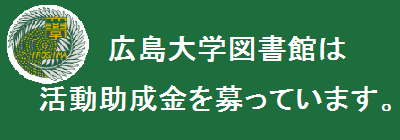Approved by Library Director: March 27, 2018
Partial Revision: April 1, 2021
1. Purpose
| Based on its guiding principles, Hiroshima University (hereinafter referred to as the “University”) has established this open access policy to (a) contribute to the further development of academic research by sharing research output with the world and (b) ensure the transparency of such output to increase accountability. |
Open access refers to making research outcomes freely accessible and available to anyone via the internet. While research published in academic journals requires subscription access, open access ensures transparency by broadly disseminating research outcomes, providing access opportunities, and enhancing visibility.
The Hiroshima University Open Access Policy represents an institutional commitment to achieving open access through unified procedures for registering research outcomes university wide.
(Reference) Hiroshima University Basic Philosophy
Inheriting the founding spirit of "a free and peaceful single university," the University fulfills its mission as a national university under five philosophical principles:
-Spirit seeking peace
-Creation of new knowledge
-Education fostering rich humanity
-Coexistence with local and international communities
-Continuous self-transformation
2. Publication of Research Outcomes
| The University provides open public access to all research output produced by the University researchers. This applies to research published in academic journals via the Hiroshima University Institutional Repository. This policy does not transfer copyright ownership. |
Research outcomes are published in the "Hiroshima University Academic Information Repository" ("Repository"), operated according to the "Hiroshima University Academic Information Repository Operation Guidelines."
Researchers are defined as those with issued IDs in the "Education and Research Information Collection System" holding the following positions. Postdoctoral researchers and graduate students without IDs are excluded pending future consideration:
Executive officers (President, Directors)
University faculty (Professors, Associate Professors, Lecturers, Assistant Professors, Research Associates, Ship Captains, Chief Officers)
Full-time contract staff (Special Appointed Professors, Special Appointed Associate Professors, Special Appointed Lecturers, Special Appointed Assistant Professors, Endowed Chair Professors, Endowed Chair Associate Professors, Endowed Chair Lecturers, Endowed Chair Assistant Professors, Collaborative Research Chair Professors, Collaborative Research Chair Associate Professors, Collaborative Research Chair Lecturers, Collaborative Research Chair Assistant Professors, Assistant Professors)
Part-time contract staff (Special Appointed Professors, Special Appointed Associate Professors, Special Appointed Lecturers, Special Appointed Assistant Professors, Deemed Full-time Faculty)
*Based on "Promotion of Education and Research Information Disclosure" materials as of October 2017
Research outcomes registered in the Repository under this policy are papers published in academic journals, including academic journal articles, conference papers, and bulletin papers from publications issued by publishers, academic societies, and university departments. Books are excluded.
Copyright does not transfer through Repository registration; original copyright holders retain their rights.
3. Scope of Application
| This policy applies to all research output published after the policy goes into effect. However, it is also recommended that research output published prior to the policy going into effect be publicly released as well. |
This policy applies to research outcomes published after its implementation (from the approval date of March 27, 2018). However, publication of pre-implementation outcomes is encouraged for reputation enhancement and research preservation purposes. Award-winning papers contributing to university reputation are strongly recommended for publication.
4. Exceptions
| The University will not provide open public access to research output it has judged to be unfit for open access. |
(1) When researchers apply for non-disclosure with justification through "Open Access Application Exception Request," the Hiroshima University Library Management Committee determines publication appropriateness and notifies the researcher. However, if the Library confirms that copyright has been transferred to publishers and no version (including final author manuscript) is permitted for publication by copyright holders, no application is required.
Expected Reasons (Examples):
Research outcomes contain personal information or privacy-related content inappropriate for internet disclosure
Co-author consent cannot be obtained
Desire to avoid publishing content different from publisher version due to proofreading
Other special circumstances
(2) Library Director Determination of Inappropriate Publication
- Research Misconduct: In cases of fabrication, falsification, plagiarism, or other research misconduct, publication will be withheld according to University decisions.
- Other Cases: When non-disclosure consideration is necessary, the Hiroshima University Library Management Committee determines publication appropriateness.
5. Submission
| Researchers should promptly submit the author’s final manuscript to the University after obtaining informed and formal consent of co-authors (if applicable). |
(1) Timing of Provision
Researchers should provide outcomes as promptly as possible after research publication. When publisher policies impose embargo periods, the Repository's access restriction function delays publication until the specified date.
(2) Method of Provision
Researchers provide outcomes following Repository content registration procedures.
Reference:
(3) Final Author Manuscript Submission
Researchers must provide the final author manuscript. Institutional repositories typically accept the final author manuscript (peer-reviewed version before final publisher layout) rather than the publisher's final version. Adding publisher-equivalent value (copy editing, formatting, technical improvements, page layout) to the final author manuscript is not permitted.https://hiroshima.repo.nii.ac.jp/2

①Submitted version (pre-review manuscript submitted to publisher): submitted version, pre-print
②Revised version (manuscript revised after peer review): revised version
③Final author manuscript (manuscript accepted by publisher after peer review): final author's manuscript, accepted author manuscript, peer-reviewed version, post-print
④Publisher version (published version after publisher typesetting): publisher's version, final publisher's version, VoR (Version of Record)
(4) Copyright
・Copyright Confirmation
The Library confirms copyright permissions for submitted research outcomes. When publisher versions are available for publication, the Library obtains and publishes the appropriate version. Copyright policy information is typically available on publisher websites, but the Library may inquire about Copyright Transfer Agreements when unclear.
Sample Publisher Policies
| Publisher |
①Submitted ②Revised Version |
③Final Author Manuscript |
④Publisher Version |
| Elsevier | Permitted | Restricted (1-3 year embargo, CC attribution required) | Not permitted |
| Wiley | Permitted | Restricted (1–4-year embargo) | Not permitted |
| Springer | Permitted | Restricted (1 year embargo) | Not permitted |
| Nature | Permitted | Restricted (6-month embargo) | Not permitted |
| American Chemical Society | Restricted (written permission required, must not violate ACS ethics guidelines) | Restricted (1 year embargo when institutional OA required - Hiroshima University qualifies) | Not permitted |
| American Physical Society | Permitted | Permitted | Not permitted |
・Co-author Confirmation
Researchers must confirm with co-authors before providing research outcomes (written documentation not required for submission).
(5) Open Access Duplication
Even for research outcomes already available through external repositories (arXiv, ResearchGate) or published as open access articles, researchers must provide outcomes to the University to ensure institutional responsibility for research preservation and long-term access guarantee.
6. Preserving Research Materials
| Researchers should retain research materials as advised in the “Hiroshima University Research Materials Preservation Guidelines.” |
Researchers must preserve research materials underlying published outcomes according to the "Hiroshima University Guidelines for Preservation of Research Materials" to enable scientific explanation if research misconduct allegations arise.
7. Others
| Open access issues unstated in this policy shall be discussed and negotiated between all parties concerned (i.e., the University and researchers) when they arise. |
Matters not specified in this policy shall be determined through consultation among relevant parties, with coordination among internal departments and publishers as necessary.
Contact Information:
Hiroshima University Library Academic Information Planning Group
Phone: 082-424-6228 Email: tosho-kikaku-jyoho@office.hiroshima-u.ac.jp
Supplementary Provisions:
This guideline takes effect from March 27, 2018.
Supplementary Provisions (Partial Revision)
This guideline takes effect from April 1, 2021.


 Home
Home







